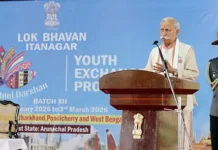Flights Of Fantasy
[ M Panging Pao ]
1 April, 2022 heralded the dawn of a new era with the withdrawal of the contentious Armed Forces (Special Powers) Act or AFSPA from many areas of the Northeast. There was vociferous demand from most sections of the society for removal of the contentious AFSPA, especially after the killing of 14 civilians during a counter-insurgency operation by security forces in Mon district of Nagaland.
The AFSPA is being removed from 15 police station areas in seven districts of Nagaland; 15 police station areas in six districts of Manipur; and 23 districts entirely and one district partially in Assam.
However, the status quo has been maintained for Arunachal Pradesh, ie, the AFSPA will remain in force in three districts of Tirap, Changlang and Longding and two police stations of Namsai and Mahadevpur.
As per the government, most extremist groups have laid down arms, expressing faith in the Constitution of India, with about 7,000 militants surrendered in the last few years. In comparison to 2014, there has been a reduction of 74 percent in militant incidents and 60 percent reduction in deaths of security personnel in 2021.
The AFSPA was enacted in 1958 and authorises the central government and the states to declare regions as ‘disturbed areas’. In these ‘disturbed areas’, the Act gives the armed forces extraordinary powers, including immunity from legal action and licence to kill and arrest people without obtaining warrants. There can be no prosecution, suit or any other legal proceeding against anyone acting under that law.
Earlier, the Jeevan Reddy Committee had also recommended that the AFSPA should be repealed. Similarly, the Santosh Hegde Committee report in 2013 said that the AFSPA gave “sweeping powers” to men in uniform without granting citizens protection against its misuse.”
Another perplexing aspect is that some of the most violent antinational acts have occurred in Naxal-infected areas of Chattishgarh, Odissa, Jharkhand, Maharashtra, Madhya Pradesh, etc. The largest massacre of security forces was in Dantewada, Chhattisgarh, wherein 76 CRPF jawans were massacred by Maoists. Despite the increasing violence and lawlessness, the AFSPA has never been applied in these states.
It is evident that most states of NE India had become police states with the presence of numerous security forces armed with extraordinary powers. The antinational activities and violent incidents by Maoists in the states of central India are similar to those occurring in NE India, if not more. Then the moot question is: Why is the AFSPA not being implemented in these states? Why has army deployment been avoided in these states?
The news about the withdrawal of the AFSPA from most areas of the Northeast is welcome news for most people living in the area. The day is not far when the entire Northeast and Arunachal would be free from the AFSPA and peace would prevail. (The contributor is retired Group Captain, Indian Air Force)

